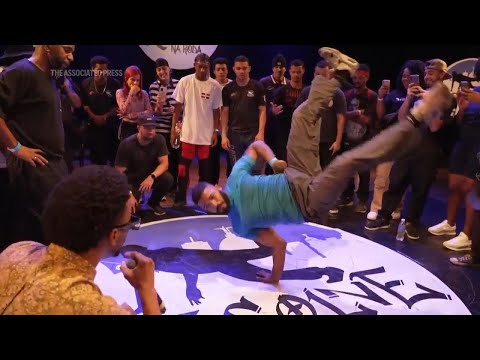(17 Jun 2024)
RESTRICTION SUMMARY:
ASSOCIATED PRESS
Rio de Janeiro, Brazil – 14 June 2024
1. Various of Flow021 breaking crew performing at an elementary school event
ASSOCIATED PRESS
Rio de Janeiro, Brazil – 5 June 2024
2. SOUNDBITE (Portuguese) Gabriel Barreto, known as “Stal”, founder of Flow 021 dance crew:
“We were always marginalized. So, with the breaking event at the Olympics, we now have access to people who didn’t give us access, to companies that didn’t look at us. We’re even starting to attract the attention of public authorities to our dance and our culture in general."
ASSOCIATED PRESS
Rio de Janeiro, Brazil – 16 June 2024
3. Various of b-boys (breakdancers) dancing during breakdance event
4. DJs and Gabriel Barreto, known as “Stal”, dancing during the event
5. Various of amputee b-boy dancing
ASSOCIATED PRESS
Rio de Janeiro, Brazil – 5 June 2024
6. SOUNDBITE (Portuguese) Gabriel Barreto, known as “Stal”, founder of Flow 021 dance crew:
++SOUNDBITE PARTIALLY COVERED BY SHOTS 3-5 AND 7++
“We had the opportunity to be a reference for young people who came and to guide them so that they could follow a better path in their lives. Because things here are crazy, as we say, Rio de Janeiro is not Disneyland, if you falter, these kids lose themselves.”
ASSOCIATED PRESS
Rio de Janeiro, Brazil – 14 June 2024
7. Barreto and other members of Flow021 walking down a road in the Turano Favela
STORYLINE:
Breakdancing will debut as an official Olympic sport at the Paris 2024 games and it has already changed the lives of dancers in Rio de Janeiro.
Since 2010, the Flow021 crew has been active in Rio Comprido, a neighborhood surrounded by favelas like Morro do Turano.
Since their first year together, social projects have been a big priority for the group. In exchange for a room to practice in schools, they offer to teach local children for free.
“We had the opportunity to be a reference for young people who came and to guide them so that they could follow a better path in their lives," said Gabriel Barreto, professionally known as “Stal”, one of the founders of Flow021.
Breakdancing, or breaking, is a style of street dance that first started in the 1970s, in the Bronx borough of New York. Deeply rooted in hip-hop culture, it’s known for acrobatic movements and stylised footwork, with it’s rhythm set by a DJ and a master of ceremonies during, what are known as, battles.
As many other symbols of Black culture, it has been marginalized and looked down upon by more traditional performing arts. Its inclusion as an Olympic sport immediately opened doors for breakdancers, who are also known as "b-boys" and "b-girls".
“We now have access to people who didn’t give us access, to companies that didn’t look at us. We’re even starting to attract the attention of public authorities to our dance and our culture in general,” said Barreto.
The crew has since organized many breakdancing events, promoting the sport not only in Rio but elsewhere in Brazil, inviting athletes from other states and internationally.
With growing interest among kids in breakdancing, Barreto says the greatest reward is to bump into former trainees and hear them speaking about their studying or working achievements, knowing they played a small part in their lives.
AP video shot by Lucas Dumphreys
===========================================================
Clients are reminded to adhere to all listed restrictions and to check the terms of their licence agreements. For further assistance, please contact the AP Archive on: Tel +44(0)2074827482 Email: info@aparchive.com.
Find out more about AP Archive: http://www.aparchive.com/HowWeWork
Twitter: https://twitter.com/AP_Archive
Facebook: https://www.facebook.com/APArchives
Instagram: https://www.instagram.com/APNews/
You can license this story through AP Archive: http://www.aparchive.com/metadata/youtube/3c4ac3902c5b4fe38c10e2aeda52acbf






